We’ve collected and analyzed the best display ads to help you come up with the perfect campaign for your business.
Display ads are quite the worthwhile investment for a business. They yield widespread and targeted exposure across the web; they help consumers get familiar with and more easily recognize your brand, and retargeting with display ads have a high ROI.

But, display ad click-through rates (CTRs) are, on average, a fraction of search ad CTRs—the reason being that while you can target for general interests and behaviors, you can’t directly target exact phrases prospective customers are typing into the search box when seeking out a product, service, or solution—as is the case with paid search ads.
What this means is, to compel someone to click on your display ads, you need outstanding visual creative and compellng copywriting. But it’s not easy to think up a great display ad from scratch. That’s why we’ve compiled some of the best display ads we’ve seen so far in 2020 to inspire your next campaign. We will:
As mentioned above, display ad CTRs are a fraction of search ads of 0.46 percent, which about 1/10th of the click-through rate (CTR) of the average search ad. This makes them a challenging marketing strategy to execute, but when done right, the benefits of display advertising are pervasive and long-lasting. These examples will equp you with some great display ads ideas and strategies so you can experience these benefits without having to start from scrach.
You may not need a lot of text or compelling ad copy to grab someone’s attention with a display ad. In fact, it’s often much better to keep things simple, like with this Apple display ad example below.

An example of an effective Apple display ad
Just look at this leaderboard ad for the Apple TV gift card. They highlight the colorful cards themselves and use four words of copy in total.That might sound like it’s not enough, but because of word selection, the ad copy works well.
It also capitalizes on the current situation and trend of staying at home and watching movies, rather than going out to the theater.”Learn more” isn’t the strongest call to action, but the high-contrast blue is strong and, otherwise, it’s a great ad.
The same campaign also includes two square display ads with an interesting use of emojis to replace letters in the copy.
You can find more great Apple marketing campaigns in our epic product marketing examples post.
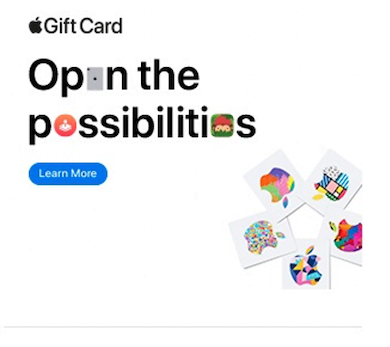
These Apple display ads use emojis to replace letters.
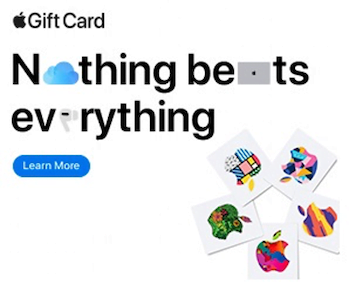
Both ads focus on the versatility of the gift card, and how you can use it for music, movies, or other entertainment on multiple devices.Plus, using emojis in ad text has been shown to boost CTR for social media ads, so why not implement it with display? If you want to stand out on the Google Display Network, you need to do something differently. The emoji headlines grab the eye without being noisy, annoying, or out of place on publisher sites.
Apple is good at marketing…who knew?
🛑 Get the guide >> How to Make Great Landing Pages (with Crazy High Conversions)
If you’re promoting a new offer, you could learn from Geico’s skyscraper display ad.
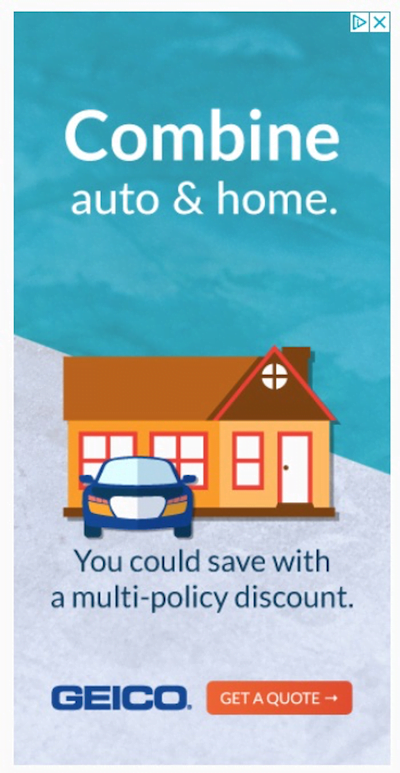
Everybody knows Geico for car insurance, but many don’t know about their home insurance. This display ad uses Geico’s brand awareness as a car insurance company to push a better, cheaper policy for both car and home.
The icons and color contrast also communicate the concept of mixing two different worlds. And it’s not the only format of banner ad they created for the campaign. Below is the square banner ad version that also uses the same concept and actually uses the phrase, “More than just car insurance:”
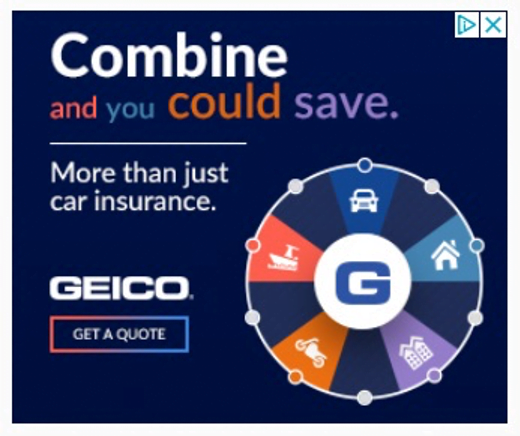
They also match the ad creative to the ad size, rather than just sizing down the house and car from the skyscraper.
As Geico has demonstrated, with the right banner ad, display can be a great medium for spreading the word about your new product or service.
In advertising, simplicity is a virtue. A potential customer can’t be interested in your product if you don’t efficiently communicate the value of your offer. Instapage’s ad simply states, “the most powerful landing page builder:”
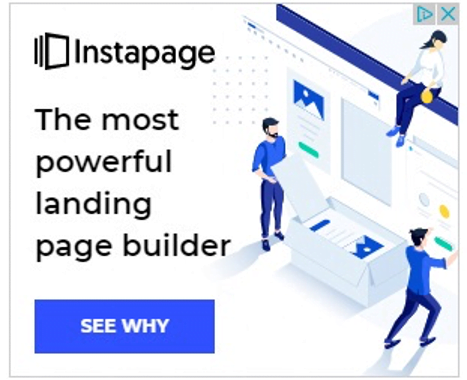
Instapage uses a bold tagline in their display ad to succinctly communicate their value.
While this display ad feature-focused, rather than benefit-focused (not normally a display ad best practice), the “see why” CTA hints at the value proposition for making the switch.
Plus, their target audience is quite technical, made up of marketing geeks (like us) who often view features as benefits. For example, there’s no need to translate that a higher conversion rate means more money in the bank.
Sometimes it’s okay to break the rules. With a game as wild and chaotic as Pubg, a simple visual and some text might not get the message across. Instead, they’ve repurposed the explosion from the cover, highlighting the action in the fast-paced game.

Repurposing existing creative for display ads can facilitate increased brand awareness.
It’s not the cleanest most original or creative ad, but it uses their brand awareness well and aligns with their actual product. Of course, the formats and norms depend on the ad network, but that shouldn’t stop you.
If you’ve got a good idea that breaks the rules, test it against a rule-following control. That’s the great thing about digital marketing. You can test all your hypotheses without having to spend a lot of time or money.
✴️ S t r e t c h your budget with our free guide: Hacking Google Ads: The Trick That Could Save You Thousands >>
The news is under fire. The allegations of “fake news” exploding over the past few years is one of the most important and concerning trends on the internet. The New York Times addresses these changes with a simple display ad that frames them as the hero:
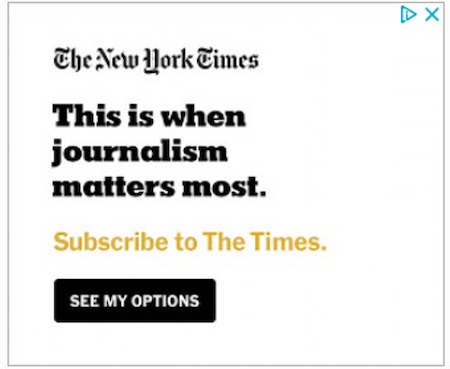
The New York Times is leveraging current trends to convey a strategic message through their display ad.
Regardless of how you feel about NYT as a news provider, it’s a smart move. In an age where news stories sourced from Twitter are common, you need a reliable source of information. Just looking at Facebook or Twitter is likely to lead you down all sorts of rabbit holes. “We’re the answer” Is the statement this effective banner ad makes. And the call to action, “see my options,” is personal and effective. It’s a great ad.
A human face can be a good way to grab someone’s attention, as long as you use it in the right way.

Of course, it might seem strange for a car brand to use such a roundabout way to market a new model. But really, they aren’t marketing their car directly with this ad. Instead, they are marketing their latest innovation—the new speaker system in their Lexus ES.
This becomes clear from the landing page with a dedicated video all about the human sense of hearing and sound design.
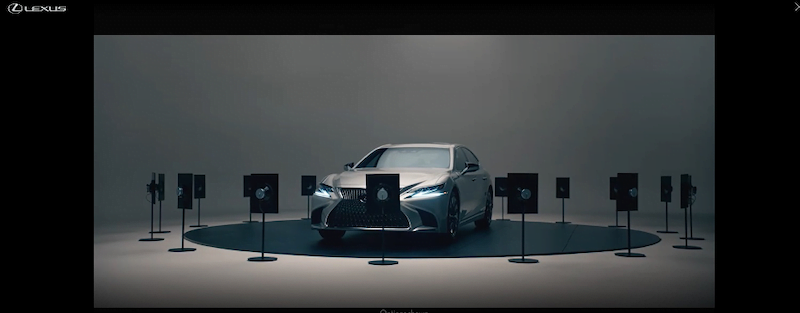
If the ad led directly to a static landing page full of car and engine specs, it wouldn’t work. But that’s not what it does. Instead, the ad and video together are meant to help cement an image of Lexus as an innovator. And it works.
Advertising is all about context. You can’t create an ad that resonates with someone if you don’t know anything about them or how they think. Mount Sinai knows what New Yorkers are going through, and knows how it’s affecting annual check-ups at their hospitals. They have taken steps to address the situation, and their display ad conveys that message well.
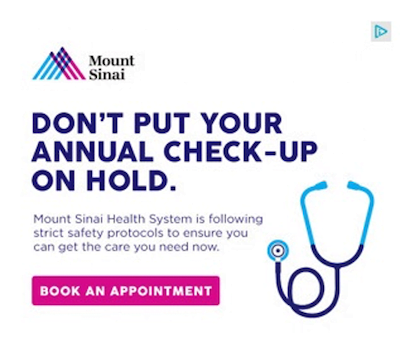
An effective display ad demonstrates how well you know your audience.
If we wanted to improve the banner ad even further, there are a few things to nitpick.
The headline and CTA are great, but the main copy is a bit long and it’s hard to read due to the small font size. They could probably reduce the length by almost half, and still convey what they want.
📚 Free guide download >> The 42 Best Call to Action Phrases Ever (& Why They Work)
What signifies class and style more than models wearing a fashion collection? The perfect setting.
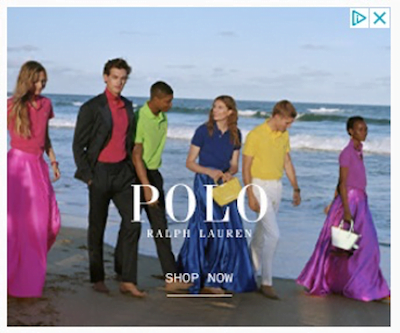
Somehow these models are dressed and fancified to the teeth, wandering along the ocean’s edge at a beach. A throwback to when people went to the beach, sure, but not to sunbathe or swim, but to socialize.
It’s perfect for the more outdoorsy brand Polo is trying to establish (their fall collection is called Road Trip). It’s a great example of branding with display ads.
Instead of featuring their shoes on a blank white or black background like many shoe companies do, Merrell chose a forest setting.

This display ad advertises an experience, not a product.
The trees, green grass, and leaves, combined with the font choice for Ontario, come together and create a longing to visit the great outdoors. This ad promises the experience of hiking, not the product itself. And of course, if you want to go hiking, you’re going to need hiking boots.
This display ad from IAS uses an eye-catching color scheme to drive home a short and punchy message.
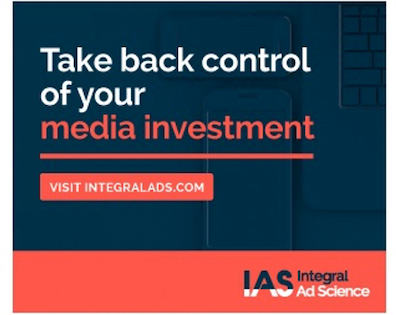
For this display ad example, the copy is the creative.
It’s incredibly simple, 9 words in total, with no real images, icons, or graphics. But it works because of the balance between creative and copy. The mad ad scientists know what they’re doing.
An ad doesn’t need to be revolutionary to be effective. Keeping things simple is often a recipe for success.
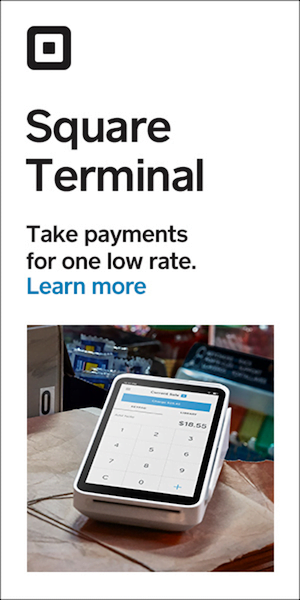
If you break down the Square ad above, these are the moving pieces:
As long as you have a good product image and a clear value proposition, you don’t need creative genius.
You don’t need to put on an expensive photoshoot with professional models to create an attention-grabbing ad. When used creatively, icons, or even stock photos can help you stand out from the crowd. This square image ad from SEMrush is the perfect cure to banner blindness.
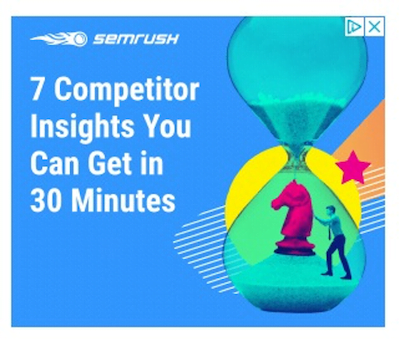
Instead of a stereotypical pedestal to indicate competition, SEMrush uses a chess piece inside of an hourglass. The hourglass symbolizes the speed at which you can gleam the competitor insights promised in the headline.
The photos have been edited to create a contrasting color scheme that grabs your attention. Of course, with the advent of HTML5, a display ad no longer has to be a static image ad. You have all kinds of animation options.

In this banner ad, SEMrush uses a smart graphic of climbing the SERPs with a link chain. The animations help serve more copy in a readable format, as well as grab the user’s attention with the movement.
This animated banner from SAP is an example of great B2B marketing.The first headline is short and concise, highlighting a common pain point for many companies: a disengaged workforce.

The copy in the next frame then introduces a solution that will help you nurture a successful workplace. It focuses on the underlying problem and high-level benefits, rather than getting bogged down in specific features.
If more B2B ads were as human and concise as this, ad blindness might be a smaller problem.
🤔 Are you taking advantage of all that Google Ads has to offer? 🤔
Find opportunities to optimize your account with the Free Google Ads Performance Grader.
This animated ad from Workplace really showcases the potential of animation in display ads. With just a few simple transitions and text, it highlights its three most important benefits to managers and business owners.

There’s no way you could do that with a static banner of the same size (without making the text illegibly small). When used right, animation is a tool that can help you convey more information to potential customers. Key takeaway here: It’s not just about grabbing attention.
Humor is a great, and often underutilized tool in the advertiser’s toolbox. This short, animated ad from PNC Bank is a great example of a display ad.
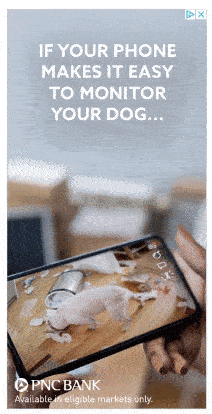
It contrasts the ease of taking pictures and using social media, with the typical difficulty of mobile banking. And it’s not just ads, like we’ve previously covered, humor works in content marketing too. That saidd, you may want to add some stand-up to your Netflix routine.
This ad from Constant Contact uses simple animation to make their ad seem smarter and more modern.
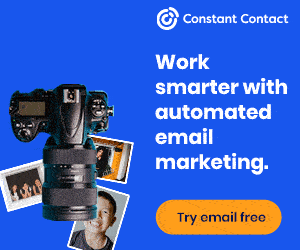
Since the ad is about smart email marketing automation, the added movement feels like a necessary addition. The rich media works almost like a promise in itself, that the ad is as smart as the service.
Interstitials are the most controversial display ad format by far. Although you get unprecedented size to advertise your message, it comes at a price.
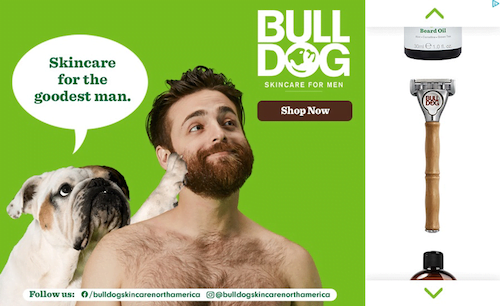
The user is forced to see the ad and often clicks (which you pay for) accidentally while trying to close the ad. But with the right banner ad design and targeting, they can still be an effective medium.
Bulldog Skincare uses a humorous image and headline to take the edge off the interruption.
The above ad examples have a wide variety of characteristics—often mutliple per ad—that support a wide range of marketing goals and intentions. To help you ensure you extract all the key takeaways, we’ve compiled a list of 20 strategies employed by these ads:
When you don’t know what you’re doing, display advertising is an easy way to waste your ad spend. But if you’re inspired by greatness (like the ads in this post) and follow tried and tested principles, you have a shot at success. But remember that your first idea is rarely the winner. Come up with a few different ideas, mix and match, and test the final ads against each other for the best results. Ongoing testing and optimization of your Google Ads is a reliable recipe for success.
